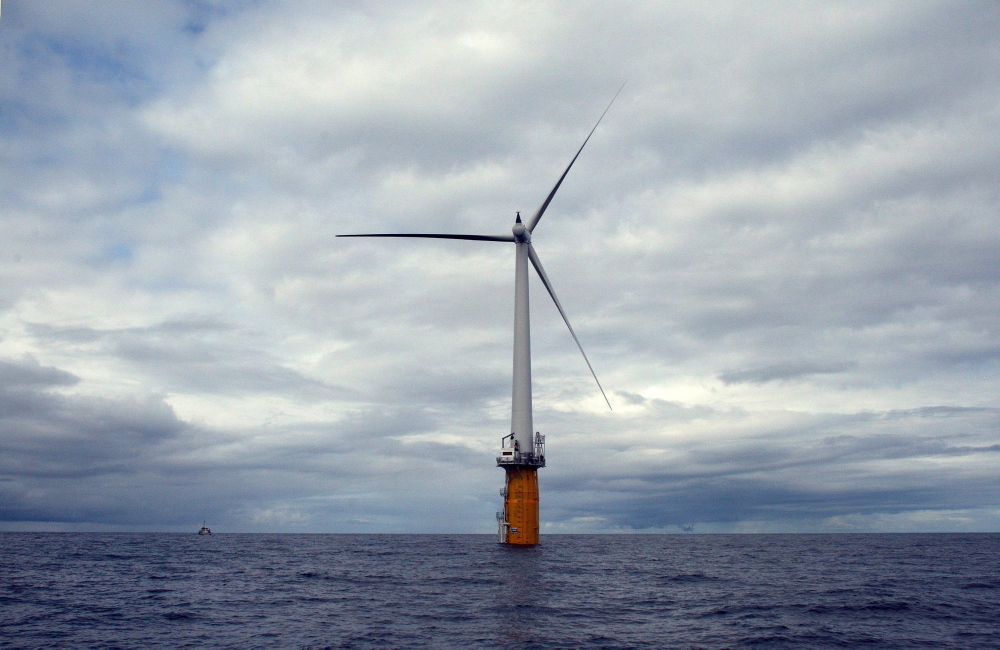A familiar name was in the news last week, when Norwegian oil giant Statoil announced that it was going ahead with Hywind Scotland, the world’s first floating offshore wind farm.
Statoil is the company that was set up to build the original Hywind demonstration project off the coast of Maine in 2013, until the legs were cut out from under the deal by Gov. Paul LePage.
For the project in Scotland, Statoil is using the $120 million it was going to spend here, along with an additional $100 million in capital. Much of that money will be going to local steel fabricators and other suppliers who will establish the supply chain for what could become a trillion-dollar global industry.
Maine will not have the benefit of being first in this competition, but fortunately it is not out of the game. This month, Maine Aqua Ventus, a partnership between the University of Maine and private investors, was awarded a $3.7 million grant from the Department of Energy to help it complete design work needed to apply for a $47 million federal grant that will be awarded next spring.
That grant, along with a nearly equivalent amount from private investors, again makes Maine a leader in affordable clean power production, which could produce good jobs for a generation of Maine workers who have suffered from the decline in manufacturing.
LEPAGE VS. RENEWABLES
With the current leadership in Augusta, that won’t be easy. LePage has made clear his opposition to all renewable energy with the exception of hydropower.
Maine lags behind the other New England states in the installation of solar power, in part because there has been no state incentive program in place since 2010. The governor has complained about the price of power from land-based wind, even though as technology has improved, it has become competitive with power from other sources.
The governor continues to pine for low-cost hydropower from Quebec, which he believes – against all evidence – that publicly owned Canadian companies would sell at a discount to Maine.
Energy experts unanimously say that notion is a myth.
Former Public Utilities Commission Chairman Tom Welch said this about cheap Canadian power at the recent Envision Maine Summit:
“I’ve never seen it. Never expect to see it. Can’t imagine why anybody would sell it to us.”
Welch says Canadians would only sell hydro down here at the New England market price, which is typically higher than Maine’s.
“So what rational Canadian executive would say, ‘Let’s sell it to Maine at less than we can get it for from Massachusetts?’ So they don’t and they won’t and, in fact, they should be put out of office if they tried.”
But offshore wind is not a dream. It will take years of work and significant investment – both public and private – but as the technology improves and the prices come down, Maine could have the same kind of competitive advantage that Canadian companies now enjoy.
The obstacles to that are not just technological, and they are not just the governor.
Opponents of onshore wind farms, particularly those that affect scenic views, have created a folklore around wind power that makes it sound as bad for the environment as burning strip-mined coal.
ANTI-WIND ARGUMENTS
They argue that the upfront costs of installing wind turbines make the power unaffordable, and they claim that because wind does not blow all the time, it is unreliable.
But the cost argument does not take into account that fuel is free over the life of the turbine.
Looking at the levelized cost of power, which takes into account all the costs for the life of the generating facility, the Department of Energy ranks wind power as one of the least expensive sources of energy, competitive with natural gas and more affordable than coal, biomass and hydro.
The intermittent nature of wind power is also exaggerated. It may be that over time, as the fleet of plug-in cars expands, wind power generated at night could be captured and stored for later use. But even if that never happens, Maine has strong, dependable winds, especially off shore, which can be a reliable part of the regional energy picture.
The loss of Statoil was a missed opportunity that will hurt worse over time if the Scotland project is a success.
But Maine still has a chance with Aqua Ventus. State officials should not let this one get away again.
Send questions/comments to the editors.


